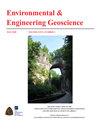基于insar -钻孔测斜仪-数值模拟的缓动滑坡综合评价方法
IF 1
4区 工程技术
Q4 ENGINEERING, ENVIRONMENTAL
引用次数: 1
摘要
我们使用基于卫星的干涉合成孔径雷达、全球定位系统和钻孔倾角数据的结果来约束数值模型,以提高对加拿大不列颠哥伦比亚省亚历山大滑坡边坡变形的理解。地表监测数据和钻孔边坡倾角仪测量结果为了解边坡破坏机制提供了重要依据。我们首先在地理信息系统(GIS)中分析数据,以创建滑坡区域的专题地图(山阴、坡度和坡向),确定关键的地质特征,并生成滑坡的工程地貌图。监测数据和地质/工程地貌模型为二维滑坡极限平衡和有限差分分析提供了重要的约束条件。初始极限平衡分析提高了对滑动表面的理解。利用有限差分模型对边坡的潜在变形机理进行了模拟研究。边坡监测与模拟相结合的结果表明,亚历山德里亚滑坡是一种缓慢移动的、多块体的、后退的边坡破坏。极限平衡和有限差分分析之间的密切一致,以及卫星和地面斜坡监测和地理信息系统数据,突出了在滑坡研究中使用多学科/综合方法的重要性。本文章由计算机程序翻译,如有差异,请以英文原文为准。
An Integrated InSAR-Borehole Inclinometer-Numerical Modeling Approach to the Assessment of a Slow-Moving Landslide
We use results of satellite-based interferometric synthetic aperture radar, Global Positioning System, and borehole inclinometer data to constrain numerical models that improve understanding of slope deformation at the Alexandria landslide, British Columbia, Canada. Surface monitoring data and borehole slope inclinometer measurements provide important insight into the slope failure mechanism. We initially analyzed the data in a geographic information system (GIS) to create thematic maps of the landslide area (hillshade, slope, and aspect), to identify key geological features, and to produce an engineering geomorphology map of the landslide. The monitoring data and the geological/engineering geomorphological models provide important constraints for two-dimensional landslide limit equilibrium and finite difference analyses. The initial limit equilibrium analysis improved understanding of the sliding surfaces. The finite difference models were then used to simulate and investigate the potential slope deformation mechanism. The combined slope monitoring/modeling results show that the Alexandria landslide is a slow-moving, multiple-block, retrogressive slope failure. The close agreement between the limit equilibrium and finite difference analyses, together with the satellite and ground-based slope monitoring and GIS data, highlight the importance of using a multidisciplinary/integrated approach in landslide studies.
求助全文
通过发布文献求助,成功后即可免费获取论文全文。
去求助
来源期刊

Environmental & Engineering Geoscience
地学-地球科学综合
CiteScore
2.10
自引率
0.00%
发文量
25
审稿时长
>12 weeks
期刊介绍:
The Environmental & Engineering Geoscience Journal publishes peer-reviewed manuscripts that address issues relating to the interaction of people with hydrologic and geologic systems. Theoretical and applied contributions are appropriate, and the primary criteria for acceptance are scientific and technical merit.
 求助内容:
求助内容: 应助结果提醒方式:
应助结果提醒方式:


